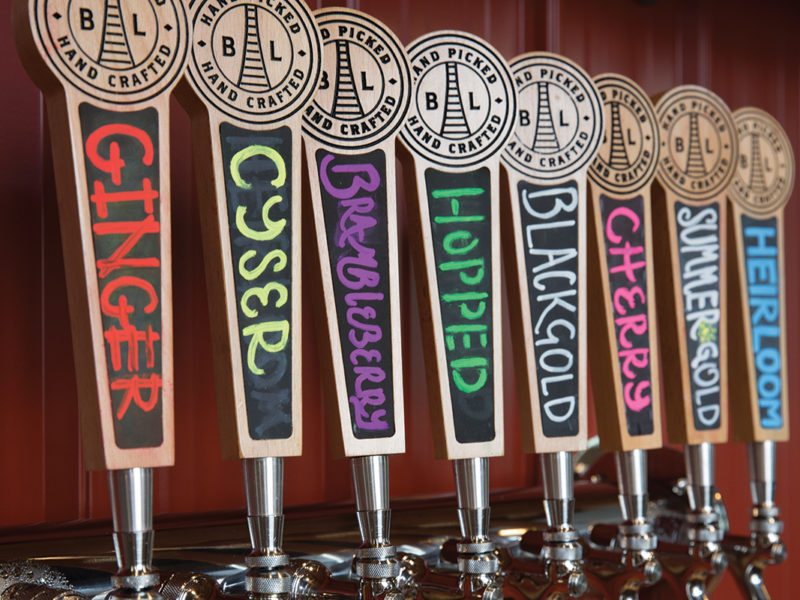
Back in 55 BC, the Romans noticed English villagers guzzling a brew made from fermented apples. It was hard cider, and today it’s one of the oldest new trends in the wine world. Thanks to its relatively low alcohol content – 4 to 6 percent – and fermentation, cider was a relatively safe substitute for that era’s contaminated water.
Naturally the Brits brought along their cider when they settled the Colonies. Some historians even claim it helped us win the Revolutionary War, thanks to the Stonewall, a half-rum, half-cider concoction that gave Yankee soldiers liquid courage to win a crucial battle at Fort Ticonderoga. In the 1800s, John Chapman, a.k.a. Johnny Appleseed, distributed seeds for apple trees across the East and Midwest, including Ohio, resulting in a far-flung blanket of orchards. Nearly all were chopped down by FBI agents and abolitionists during Prohibition. Known as “spitters” – what you’d likely do if you bit into one of those bitter, astringent crabapple wannabes – the apples were valued for their high levels of acid, tannin and sugar, adding color, body, mouthfeel, and balance when fermented into cider.
Over the decades, apples were recultivated for a taste and image as wholesome as, well, apple pie. While there are about 18 cider producers in Ohio, “we still lag behind the major fruit producing regions in the country,” in terms of cider consumption and sales, observes Matt Vodraska of Bent Ladder cider at Rittman Orchards. Major cider-producing states include Washington, Oregon, New York and Michigan. Still, according to the United States Association of Cider Makers (USACM), sales of craft cider across the US tripled in 2014 from the preceding seven years, hitting an all-time high of $600 million.
Finding the best apples for craft cider can be tricky. Orchards producing hard cider or “heirloom” apples such as Kingston Black, Foxwhelp, Esopus Spitzenberg, and 300-year-old Ashmead’s Kernel, are still relatively few and far between, so many cider makers rely on what’s available and freshest. “It’s a real challenge at times to get high-quality apples, especially during certain seasons and especially since I only use Ohio apples,” admits Peter Moon, co-owner of Mad Moon Craft Cider.
Plus it takes whole lot of them apples: “If you’re lucky, you get about 150 gallons of cider per ton,” estimates Vodraska. “That works out to about 10 apples per glass of cider.” Unlike many cideries, he owns an orchard – some 120 acres with 80 varieties of heirloom and eating apples at his disposal.
Although the processes of grinding, juicing, pressing, cooking and fermentation are fairly similar, each cidery offers up its own twist, as the following sampling illustrates. “At times, it’s more of an art than a science,” observes Tom Swank of the Winery at Spring Hill. “The trick is to be consistent and listen to customer feedback, and take clues from customers to develop new flavors.”
Most cider makers prefer to see the glass as half full in terms of opportunity. “There is plenty of room for the cider market to grow, especially in Ohio,” adds Swank.
Bent Ladder (Doylestown)
Available by the glass, in pitchers or flights, hard ciders are on tap in the rustic tasting room. Flavors range from brambleberry to cherry to summer gold, made from ginger gold apples. Coming soon: Old Orchard and the intimidating-sounding Bad Hombre. Visitors can take favorites home in refillable (and recyclable) glass bottles.
Mad Moon (Columbus)
Peter Moon and his wife Sally started brewing cider in a tiny garage in an obscure industrial park, recently adding an additional 1250 square feet to accommodate their rapidly expanding operation. Along with a taproom that’s only open Saturdays, their brews are available on tap and in grocery stores primarily in Central Ohio. Flavors range from Hop-Wired with beer to the semi-sweet Unglued Caramel Apple to Beastie Tea infused with organic teas and more.
Winery at Spring Hill (Geneva)
This restaurant/winery offers live music in the summer and a cozy fireplace in the winter, making it a destination in itself. Along with some 22 different wines, visitors can enjoy hard ciders available in 12-ounce bottles, on tap and in growlers in such flavors as Orchard Original, Blueberry Hill, Spiced Apple and Hopped Up as well as limited-issue Bourbon Barrel-aged Maple and Rum Barrel-aged Cider.
Over-the-Rhine (OTR) Cider Company (Cincinnati)
Relatively new to the cider scene, OTR is a familiar face in brewing, as the company was originally founded in 1853 by Bavarian immigrant, blacksmith and master brewer Christian Moerlein. It survived Prohibition and currently operates out of the well-trod, cave-like Christian Moerlein Malthouse Taproom in the Over-the-Rhine district. In 2016 OTR Cider launched two tart, effervescent brews, the red Original Hard Cider and green Crisp Hard Cider.
Griffin Cider Works (Westlake)
A British native, Richard Read was well ahead of the curve when he started brewing his English-style ciders in 2010. Five years later, he opened Griffin Cider House and Gin Bar, Cleveland’s first bar dedicated to serving hard ciders, including Griffin Original, a medium-dry, lightly carbonated apple cider. He also offers revolving varieties infused with lemon, ginger and elderberry, along with UK-style food, atmosphere and friendly service.
West End Cider House (Athens)
This cider bar is owned by Deanna Schwartz, while local distiller Kelly Sauber crafts the cider as well as her own brand, Fifth Element Spirits, for cocktails. Made from Ohio grown apples, the preservative-free cider is available on tap with a changing daily selection. Also offered are a wide array of “guest ciders” from Ohio and around the world.

